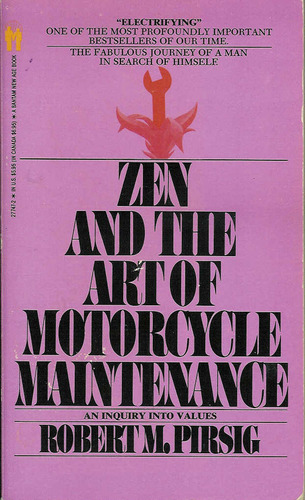Debugging your startup requires peace of mind because debugging any problem, including debugging yourself, requires peace of mind. It’s what enables you to stay in flow.
Debugging Your Startup Requires Peace of Mind
 I remember reading Zen and the Art of Motorcycle Maintenance by Robert Pirsig in high school and being profoundly affected by it. I didn’t realize how deeply some of the ideas had affected me until I started to re-read it years later and it was still deeply familiar. Here are some excerpts on the importance of peace of mind for solving problems.
I remember reading Zen and the Art of Motorcycle Maintenance by Robert Pirsig in high school and being profoundly affected by it. I didn’t realize how deeply some of the ideas had affected me until I started to re-read it years later and it was still deeply familiar. Here are some excerpts on the importance of peace of mind for solving problems.
“Assembly of Japanese bicycle require great peace of mind.”
This quote from a Japanese bicycle manual seems at first to be a poor translation, but Pirsig riffs on it as expressing a deeper Zen truth.
“The ultimate test’s always your own serenity. If you don’t have this when you start and maintain it while you’re working you’re likely to build your personal problems right into the machine itself.”
Robert Pirsig in Zen and the Art of Motorcycle Maintenance
I think entrepreneurs also build their shortcomings into their startups:
- Low trust and a desire for control leads to an inability to delegate effectively or high quality people, resulting in very low limits on the size of the business that can be grown. The paradox is that “trust but verify” and “attention to detail” are also essential to success in a small bootstrapped firm, the challenge is knowing how to establish mutual trust to enable effective delegation.
- Greed and impatience lead to a willingness to cut corners and customers feeling taken advantage of. Again the challenge is balancing dissatisfaction with the status quo and a legitimate desire to make a profit from delivering value with a commitment to creating real value for your customers and the patience to continue to improve our offering.
- A desire to embrace novel solutions can mask an attention span that’s too short to persevere through the boring but necessary work of refining your offering, innovating only where it truly differentiates your product.
Best Recipe For Success is to Stay in Flow
“Sometime look at a novice workman or a bad workman and compare his expression with that of a craftsman whose work you know is excellent and you’ll see the difference. The craftsman isn’t ever following a single line of instruction. He’s making decisions as he goes along. For that reason he’ll be absorbed and attentive to what he’s doing even though he doesn’t deliberately contrive this. His motions and the machine are in a kind of harmony. ”
Robert Pirsig in Zen and the Art of Motorcycle Maintenance
There is a lot of hunger for “recipes for success” and surefire methods for global market domination. But markets are served by complex ecosystems that require an ability to see things as they are now, not just look for patterns that match a famous entrepreneur’s autobiography or a Harvard Business Review article.
The real cycle you’re working on is a cycle called yourself. The machine that appears to be “out there” and the person that appears to be “in here” are not two separate things. They grow toward Quality or fall away from Quality together.
Robert Pirsig in Zen and the Art of Motorcycle Maintenance
Startups require a full immersion in your customer’s operating reality and a willingness to harmonize your vision with their real needs. Unfortunately this always seems to require more changes on the entrepreneur’s part than the customers, which means that they have to be viewed more as a self-improvement process than a customer education project.
Related Blog Posts
Here are some related blog posts on entrepreneurial success requiring ongoing self-improvement to be sustained:
- “Successful Entrepreneurship Is An Ongoing Self-Improvement“
- “Some Days You are the Potter, Some Days You Are The Clay“
- “Recurring Problems Have Both Technical and Psychological Roots“
- “In The Beginning: The Founders Are The Business“
- “Prospects Will Say Your Baby is Ugly“
- “Unfamiliar Pain“
- “Some Things Change, Others Remain Constant“
- “Entrepreneurs Need Gumption to Succeed“
“Shhh! I’m listening to reason.”
Pee-wee to Francis in Pee-wee’s Big Adventure

Totally agree. We are often our own worst enemies, getting in the way of our own success. Whether we have a goal of becoming healthier or launching a company, insecurities, work ethics, among other things, often cause most of the problems.
Pingback: SKMurphy, Inc. » The Likely Consequences of Entrepreneurship Require Perseverance
Pingback: SKMurphy, Inc. » Discerning the Future
Thanks, I read this in college and this post encourages me to go back and re-read it with an older man’s eyes. I had not considered that I was “building my problems into my business.”
Pingback: SKMurphy, Inc. » Quotes For Entrepreneurs–July 2012